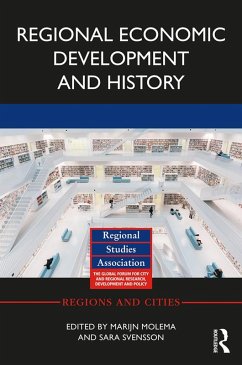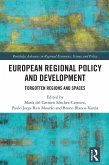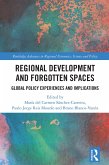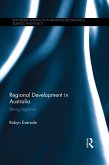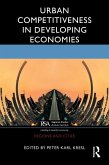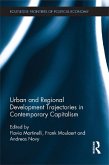Regional Economic Development and History (eBook, ePUB)
Redaktion: Molema, Marijn; Svensson, Sara
42,95 €
42,95 €
inkl. MwSt.
Sofort per Download lieferbar

21 °P sammeln
42,95 €
Als Download kaufen

42,95 €
inkl. MwSt.
Sofort per Download lieferbar

21 °P sammeln
Jetzt verschenken
Alle Infos zum eBook verschenken
42,95 €
inkl. MwSt.
Sofort per Download lieferbar
Alle Infos zum eBook verschenken

21 °P sammeln
Regional Economic Development and History (eBook, ePUB)
Redaktion: Molema, Marijn; Svensson, Sara
- Format: ePub
- Merkliste
- Auf die Merkliste
- Bewerten Bewerten
- Teilen
- Produkt teilen
- Produkterinnerung
- Produkterinnerung

Bitte loggen Sie sich zunächst in Ihr Kundenkonto ein oder registrieren Sie sich bei
bücher.de, um das eBook-Abo tolino select nutzen zu können.
Hier können Sie sich einloggen
Hier können Sie sich einloggen
Sie sind bereits eingeloggt. Klicken Sie auf 2. tolino select Abo, um fortzufahren.

Bitte loggen Sie sich zunächst in Ihr Kundenkonto ein oder registrieren Sie sich bei bücher.de, um das eBook-Abo tolino select nutzen zu können.
Through a selection of accessible theoretical, methodological and empirical chapters, this book explores the connections between regional development and history.
- Geräte: eReader
- ohne Kopierschutz
- eBook Hilfe
- Größe: 2.14MB
Andere Kunden interessierten sich auch für
![European Regional Policy and Development (eBook, ePUB) European Regional Policy and Development (eBook, ePUB)]() European Regional Policy and Development (eBook, ePUB)42,95 €
European Regional Policy and Development (eBook, ePUB)42,95 €![Regional Development and Forgotten Spaces (eBook, ePUB) Regional Development and Forgotten Spaces (eBook, ePUB)]() Regional Development and Forgotten Spaces (eBook, ePUB)42,95 €
Regional Development and Forgotten Spaces (eBook, ePUB)42,95 €![The UK Regional-National Economic Problem (eBook, ePUB) The UK Regional-National Economic Problem (eBook, ePUB)]() Philip MccannThe UK Regional-National Economic Problem (eBook, ePUB)46,95 €
Philip MccannThe UK Regional-National Economic Problem (eBook, ePUB)46,95 €![Knowledge Intensive Business Services and Regional Competitiveness (eBook, ePUB) Knowledge Intensive Business Services and Regional Competitiveness (eBook, ePUB)]() Knowledge Intensive Business Services and Regional Competitiveness (eBook, ePUB)42,95 €
Knowledge Intensive Business Services and Regional Competitiveness (eBook, ePUB)42,95 €![Regional Development in Australia (eBook, ePUB) Regional Development in Australia (eBook, ePUB)]() Robyn EversoleRegional Development in Australia (eBook, ePUB)46,95 €
Robyn EversoleRegional Development in Australia (eBook, ePUB)46,95 €![Urban Competitiveness in Developing Economies (eBook, ePUB) Urban Competitiveness in Developing Economies (eBook, ePUB)]() Urban Competitiveness in Developing Economies (eBook, ePUB)42,95 €
Urban Competitiveness in Developing Economies (eBook, ePUB)42,95 €![Urban and Regional Development Trajectories in Contemporary Capitalism (eBook, ePUB) Urban and Regional Development Trajectories in Contemporary Capitalism (eBook, ePUB)]() Flavia MartinelliUrban and Regional Development Trajectories in Contemporary Capitalism (eBook, ePUB)57,95 €
Flavia MartinelliUrban and Regional Development Trajectories in Contemporary Capitalism (eBook, ePUB)57,95 €-
-
-
Through a selection of accessible theoretical, methodological and empirical chapters, this book explores the connections between regional development and history.
Dieser Download kann aus rechtlichen Gründen nur mit Rechnungsadresse in A, B, BG, CY, CZ, D, DK, EW, E, FIN, F, GR, HR, H, IRL, I, LT, L, LR, M, NL, PL, P, R, S, SLO, SK ausgeliefert werden.
Produktdetails
- Produktdetails
- Verlag: Taylor & Francis
- Seitenzahl: 208
- Erscheinungstermin: 17. Oktober 2019
- Englisch
- ISBN-13: 9780429818417
- Artikelnr.: 60580319
- Verlag: Taylor & Francis
- Seitenzahl: 208
- Erscheinungstermin: 17. Oktober 2019
- Englisch
- ISBN-13: 9780429818417
- Artikelnr.: 60580319
- Herstellerkennzeichnung Die Herstellerinformationen sind derzeit nicht verfügbar.
Marijn Molema is a historian and working as programme leader at the Frisian Institute of Social Research. He is also a guest researcher at the Fryske Akademy, a research institute in the city of Leeuwarden of the Royal Netherlands Academy of Arts and Sciences. Sara Svensson is a political scientist specializing in regional collaboration across national borders. She is Senior Lecturer at Halmstad University in Sweden and Research Fellow at the Center for Policy Studies at Central European University in Budapest (Hungary).
Prolegemenon
Bringing the past back in: Taking history seriously in the study of
regional development Ron Martin, Peter Sunley and Emil Evenhuis
Introduction
1. The importance of history for regional economic development Sara
Svensson and Marijn Molema
Part I: Disciplinary & theoretical explorations
2. Regional development, history and the institutional lens Marijn Molema
and John Tomaney
3. Behavioural economic geography and regional history: Explaining uneven
development from a human perspective Robert Huggins and Piers Thompson
Part II: Innovations in research design and methodology
4. An interdisciplinary approach to the persistent effects of Polish
partitions on educational achievements Justyna Köci¿ska and Miköaj Herbst
5. Regional GDP before GDP: A methodological survey of historical regional
accounts Kerstin Enflo and Anna Missiaia
6. Comparative research designs: Interdependence as challenge and
opportunity in regional studies Martin Åberg and Thomas Denk
Part III: Empirical case studies
7. Catching the ladder: The formation and growth of the São Paulo
automotive industry cluster Tomàs Fernández-de-Sevilla and Armando J. dalla
Costa
8. Urban and regional development policy: Its history and its differences
Kevin Cox
9. Spatial-economic development: The effect of urbanisation on education in
China, 1890-present Meimei Wang and Bas van Leeuwen
Conclusions
10. Setting an agenda for a "New Regional History" Marijn Molema
Bringing the past back in: Taking history seriously in the study of
regional development Ron Martin, Peter Sunley and Emil Evenhuis
Introduction
1. The importance of history for regional economic development Sara
Svensson and Marijn Molema
Part I: Disciplinary & theoretical explorations
2. Regional development, history and the institutional lens Marijn Molema
and John Tomaney
3. Behavioural economic geography and regional history: Explaining uneven
development from a human perspective Robert Huggins and Piers Thompson
Part II: Innovations in research design and methodology
4. An interdisciplinary approach to the persistent effects of Polish
partitions on educational achievements Justyna Köci¿ska and Miköaj Herbst
5. Regional GDP before GDP: A methodological survey of historical regional
accounts Kerstin Enflo and Anna Missiaia
6. Comparative research designs: Interdependence as challenge and
opportunity in regional studies Martin Åberg and Thomas Denk
Part III: Empirical case studies
7. Catching the ladder: The formation and growth of the São Paulo
automotive industry cluster Tomàs Fernández-de-Sevilla and Armando J. dalla
Costa
8. Urban and regional development policy: Its history and its differences
Kevin Cox
9. Spatial-economic development: The effect of urbanisation on education in
China, 1890-present Meimei Wang and Bas van Leeuwen
Conclusions
10. Setting an agenda for a "New Regional History" Marijn Molema
Prolegemenon
Bringing the past back in: Taking history seriously in the study of
regional development Ron Martin, Peter Sunley and Emil Evenhuis
Introduction
1. The importance of history for regional economic development Sara
Svensson and Marijn Molema
Part I: Disciplinary & theoretical explorations
2. Regional development, history and the institutional lens Marijn Molema
and John Tomaney
3. Behavioural economic geography and regional history: Explaining uneven
development from a human perspective Robert Huggins and Piers Thompson
Part II: Innovations in research design and methodology
4. An interdisciplinary approach to the persistent effects of Polish
partitions on educational achievements Justyna Köci¿ska and Miköaj Herbst
5. Regional GDP before GDP: A methodological survey of historical regional
accounts Kerstin Enflo and Anna Missiaia
6. Comparative research designs: Interdependence as challenge and
opportunity in regional studies Martin Åberg and Thomas Denk
Part III: Empirical case studies
7. Catching the ladder: The formation and growth of the São Paulo
automotive industry cluster Tomàs Fernández-de-Sevilla and Armando J. dalla
Costa
8. Urban and regional development policy: Its history and its differences
Kevin Cox
9. Spatial-economic development: The effect of urbanisation on education in
China, 1890-present Meimei Wang and Bas van Leeuwen
Conclusions
10. Setting an agenda for a "New Regional History" Marijn Molema
Bringing the past back in: Taking history seriously in the study of
regional development Ron Martin, Peter Sunley and Emil Evenhuis
Introduction
1. The importance of history for regional economic development Sara
Svensson and Marijn Molema
Part I: Disciplinary & theoretical explorations
2. Regional development, history and the institutional lens Marijn Molema
and John Tomaney
3. Behavioural economic geography and regional history: Explaining uneven
development from a human perspective Robert Huggins and Piers Thompson
Part II: Innovations in research design and methodology
4. An interdisciplinary approach to the persistent effects of Polish
partitions on educational achievements Justyna Köci¿ska and Miköaj Herbst
5. Regional GDP before GDP: A methodological survey of historical regional
accounts Kerstin Enflo and Anna Missiaia
6. Comparative research designs: Interdependence as challenge and
opportunity in regional studies Martin Åberg and Thomas Denk
Part III: Empirical case studies
7. Catching the ladder: The formation and growth of the São Paulo
automotive industry cluster Tomàs Fernández-de-Sevilla and Armando J. dalla
Costa
8. Urban and regional development policy: Its history and its differences
Kevin Cox
9. Spatial-economic development: The effect of urbanisation on education in
China, 1890-present Meimei Wang and Bas van Leeuwen
Conclusions
10. Setting an agenda for a "New Regional History" Marijn Molema
